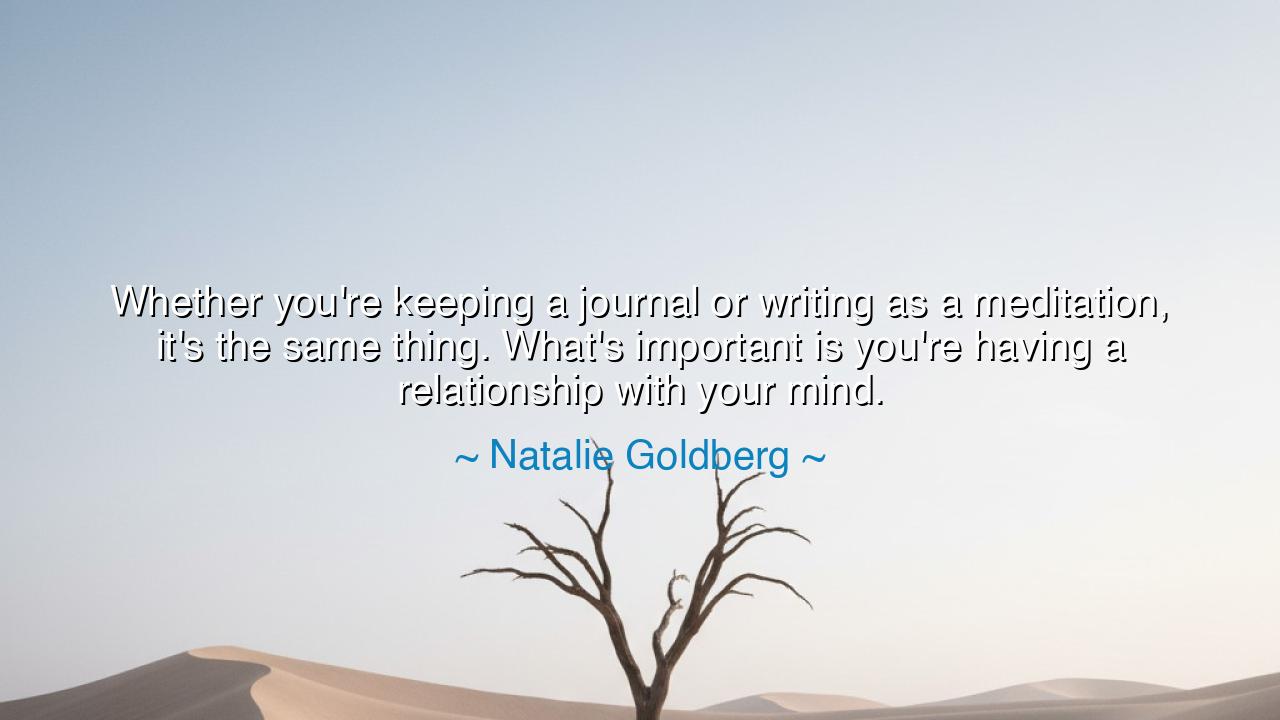
Whether you're keeping a journal or writing as a meditation
Whether you're keeping a journal or writing as a meditation, it's the same thing. What's important is you're having a relationship with your mind.






Hearken, O children of the ages, to the words of Natalie Goldberg, who speaks with the voice of reflection and revelation: “Whether you’re keeping a journal or writing as a meditation, it’s the same thing. What’s important is you’re having a relationship with your mind.” Here lies the timeless teaching that the act of putting thoughts to paper is not merely craft, but a sacred dialogue between the soul and consciousness, a communion that reveals the depths of self-awareness and insight.
In the chronicles of old, the elders observed that the heart and mind flourish when engaged in honest reflection. The journal, like the sacred scroll, and writing as a meditation, both serve as mirrors to the inner life, allowing the seeker to witness the stirrings of thought, emotion, and imagination. Goldberg reminds us that it is not the method alone, but the presence of conscious attention—the nurturing of a relationship with one’s mind—that renders the act transformative.
The origin of this wisdom is ancient, found in the lives of scribes, philosophers, and mystics who recorded reflections, insights, and visions. Across monasteries, temples, and schools, it was known that the practice of writing cultivates clarity, discipline, and understanding. To keep a journal is to enter into sacred dialogue with the self, to witness patterns, desires, and fears, and to cultivate a mind aware of its own workings.
O seekers, understand that the art of writing is a path to mastery of thought. In daily reflection, whether through the disciplined act of the journal or the meditative flow of words, the mind is engaged, trained, and liberated. The relationship with one’s mind is strengthened, and the spirit learns to discern, to comprehend, and to navigate the labyrinth of consciousness with courage and clarity.
Let this teaching endure, children of the future: honor the act of writing as sacred communion, and cherish the journal as a vessel for insight. By cultivating a mindful relationship with your mind, you awaken awareness, sharpen judgment, and illuminate the hidden chambers of the soul. The pen becomes a wand, the paper a mirror, and the act of reflection a rite of self-discovery.
In this eternal truth, the mortal learns that the mind, like the heart, requires attention, dialogue, and respect. Through the practice of writing—be it a journal or a meditative exercise—the spirit nurtures clarity, understanding, and wisdom. In this sacred relationship, thought becomes light, consciousness becomes a guide, and the soul walks illuminated upon the path of self-knowledge.
If you wish, I can also craft a more poetic, ceremonial version, where writing and the relationship with the mind are depicted as a sacred ritual of illumination and inner communion. Would you like me to do that?






TANguyen Thi Thuy An
I really resonate with this idea that writing connects us to our minds. It’s fascinating how both journaling and meditative writing can offer such deep insights into our thoughts. Do you think this kind of practice helps clear the mind, or does it sometimes bring out more confusion by uncovering things we weren’t aware of?
NKNgan Kim
Natalie Goldberg’s point about writing as a way to build a relationship with your mind is so true. It’s like you’re becoming more aware of your inner world. Do you think this kind of self-awareness through writing can help solve personal challenges, or do you think it’s more of a spiritual practice for finding peace?
LANguyen Thi Lan Anh
This quote makes me think about how much writing can be a tool for self-reflection. It’s not just about writing down words, but about understanding what’s going on inside our heads. Do you believe that writing can be a powerful form of meditation? Or are there other ways to truly connect with our minds?
KLKhanh Lam
I love this perspective by Natalie Goldberg. Writing feels like a way to connect with our thoughts, almost like a conversation with ourselves. Do you think journaling or writing as meditation can help people better understand their emotions and thoughts, or is it just another way of expressing what’s already in the mind?